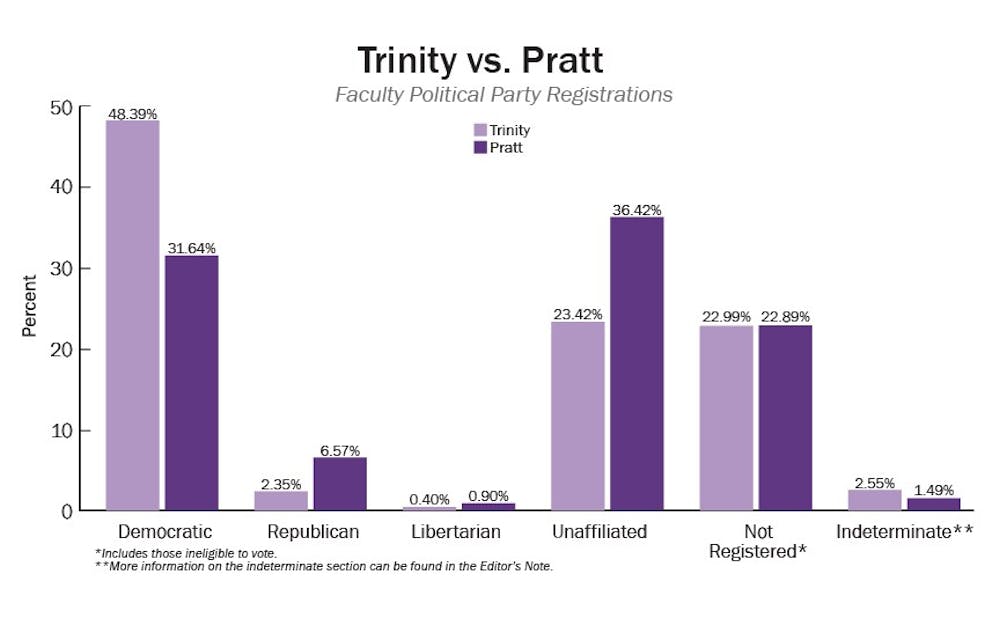My article—“For each Republican faculty member in Pratt and Trinity, there are nearly 13 Democrats. Is this a 'crisis'?”—examines the North Carolina voter registration records of professors in the Trinity College of Arts and Sciences and the Pratt School of Engineering. This includes 1494 names that were recorded from department “faculty” pages and searched in North Carolina’s voter registration record database.
According to my calculations, approximately 22.99% of Trinity faculty and 22.89% of Pratt faculty are not registered to vote in North Carolina.
This includes those who are ineligible to vote in the United States, such as faculty members who are not citizens. It is impossible to know, however, what proportion of faculty is ineligible to vote because citizenship records are not public.
Duke professors who are registered under a political party are registered under the Democratic Party (D), Libertarian Party (Lib) or Republican Party (R). Those who are registered to vote but are not registered under a party are listed as unaffiliated (U).
In the end, this resulted in a dataset of nearly 1500 faculty members that was sorted into a dozen spreadsheets, and also resulted in myself having to solve many electronic puzzles to prove to Whitepages that I’m not a robot.
There were 30 Trinity departments and four Pratt departments recorded.
The Pratt website lists that there are four departments: biomedical engineering (BME), civil and environmental engineering (CEE), electrical and computer engineering (ECE) and mechanical engineering and materials science (MEMS).
There are three academic disciplines in Trinity, listed as tabs at the top of the website: Arts and Humanities, Natural Sciences and Social Sciences. These tabs function as dropdown menus, listing the departments, centers and other programs within the disciplines.
Philosophy and psychology and neuroscience were listed under two disciplines. In the article, philosophy is counted within arts and humanities, and psychology and neuroscience is counted within natural sciences.
Although the health, wellness and PE department is listed under arts and humanities and as an academic department, it was not counted in the article because it does not have a faculty page.
Names of faculty members were recorded as they are listed on department faculty pages, and they were manually searched in North Carolina’s online voter registration record database.
To confirm if the resulting voting record was the faculty member, various methods were used. Some include using Whitepages, Scholars@Duke, curriculum vitae (CV), personal websites and Google Maps.
Faculty members whose voter records were not able to be determined after searching their names were recorded as indeterminate.
Needless to say, the process of verifying the data accumulated into multiple, worthwhile weeks, and now I instinctively look twice whenever I see a crosswalk, fire hydrant or store front.
Get The Chronicle straight to your inbox
Signup for our weekly newsletter. Cancel at any time.

Stefanie Pousoulides is The Chronicle's Investigations Editor. A senior from Akron, Ohio, Stefanie is double majoring in political science and international comparative studies and serves as a Senior Editor of The Muse Magazine, Duke's feminist magazine. She is also a former co-Editor-in-Chief of The Muse Magazine and a former reporting intern at PolitiFact in Washington, D.C.

